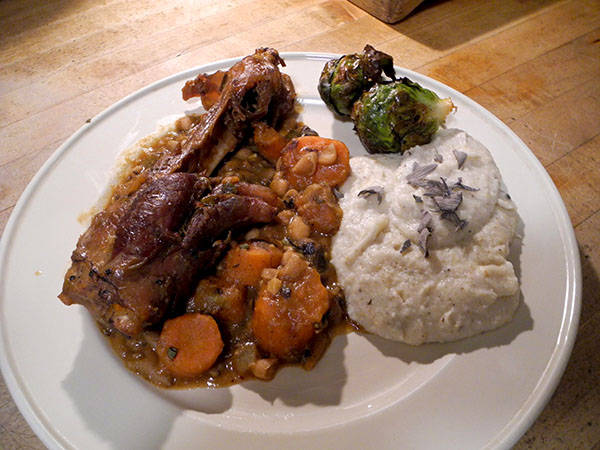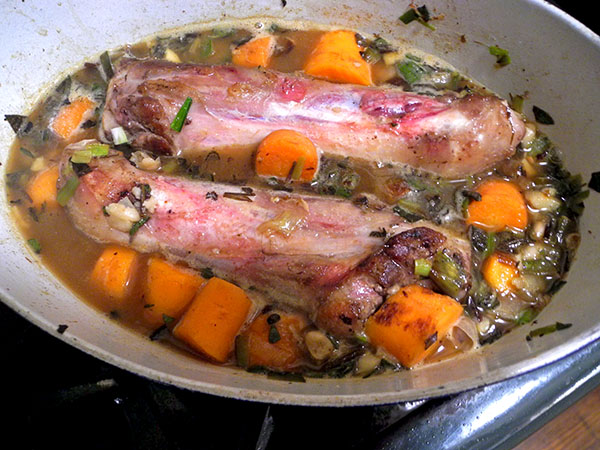
This was a sublime winter meal, and almost embarrassingly easy to put together.
I used a recipe, with almost no deviations, from a specialty cookbook I bought in Brooklyn almost as soon as I had learned that I could buy local goat cuts in the Union Square Greenmarket. The title is ‘Goat: Meat, Milk, Cheese‘ and the authors are Bruce Weinstein (he cooks) and Mark Scarbrough (he writes).
It was great fun, and even though our shanks were a little smaller than those described in the recipe, we were surprised to sit down to dinner roughly an hour and a half earlier than the recipe’s program had suggested: After quickly getting the braise together inside the pot I was looking forward to an interval during which I could catch up on writing or reading (about food, to be sure), but when I got up to check and stir the pot the second time, maybe 50 or 55 minutes into the 2 1/2 hours my guides had predicted it would take, I realized that the meat was nearly ready. I know it could have gone further, but not for an additional hour and a half, and the meat already offered no resistance when pierced with a metal tester.
I then worked rapidly on the rest of the meal, rushing the Brussels sprouts into the oven and quickly assembling the ingredients for the polenta, both of which might take 25 minutes. I knew the goat braise would be understanding, so there wasn’t any panic with the timing, and everything came together perfectly in the end.
The picture below shows what the shanks looked like just after I had replaced them in the pot in which they had earlier been browned then removed to the side, and after sautéing the vegetables, adding the chicken broth and white beans, and bringing the liquid to a simmer.

- for the goat braise, the only changes I made to the recipe, which I halved, were the addition of a medium-width 6-inch celery stalk, sliced, from Philipps Farms; a crushed piece of dark dried habanada pepper; and a reduction by roughly half in the cooking time it describes, so rather than re-enter the recipe text, I’ll only list the source of the ingredients I used: two goat shanks, weighing a total of 21 ounces, from Tony at Consider Bardwell Farm; 4 medium orange carrots from John D. Madura Farm; one small leek from Hawthorne Valley Farm; one mediium Rocambole garlic clove from Keith’s Farm; a tablespoon of fresh sage leaves from Philipps Farm; one teaspoon of zest from a Whole Foods Market organic lemon; 2 or 3 tablespoons of Few Spirits Breakfast Gin; one cup of low-sodium Better Than Bouillon chicken base; and almost one cup of Eden Foods organic cannellini beans
- polenta made using this excellent Mark Bittman recipe, ‘Polenta Without Fear‘, very gradually adding, while stirring, two thirds of a cup of coarsely-ground Iroquois White Corn Project white corn flour from the Greenmarket Regional Grains Project stall in the Union Square Greenmarket) to a pot in which 2 cups of water and 2/3 of a cup of excellent Trickling Springs Creamery milk from Whole Foods Market (the proportion always begins as 3 to 1, but additional fresh water will always have to be added along the way) had been brought to a boil, then stirred continually for about 15 or 20 minutes, and when the mixture was creamy and the cornmeal tasted cooked, seasoned with a pinch of salt, finished with several tablespoons of several 4 tablespoons of Organic Valley ‘Cultured Pasture Butter’, and properly seasoned with sea salt, garnished with a few small fresh sage leaves from Philipps Farm
- four good-size Brussels sprouts from Phillips Farms, washed, trimmed, dried, tossed with olive oil, sea salt and freshly-ground black pepper, roasted in a 400º oven on a small unglazed Pampered Chef oven pan until they were browned and crisp on the outside, or for about 20 minutes,
- the wine was an Italian (Puglia) red, Aglianico Polvanera 2009, from Garnet Wines & Liquors
- the music was Wagner’s 185-1861 ‘Tannhäuser’, Giuseppe Sinopoli conducting the Philharmonia Orchestra and the Royal Opera House Covent Garden Chorus., with Agnes Baltsa, Andreas Schmidt, Placido Domingo, Matti Salminen, Kurt Rydl, Oskar Hillebrandt, Clemens Bieber, Cheryl Studer, Barbara Bonney, Margaret Stobart, Ingrid Baier, Jeanette Wilson, Karen Shelby, and William Pell